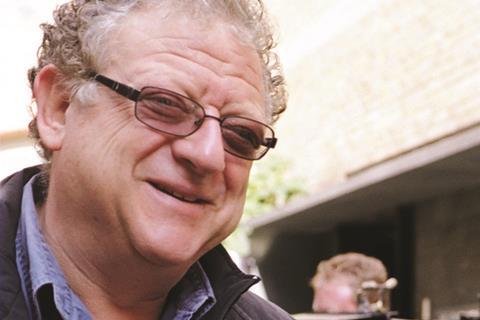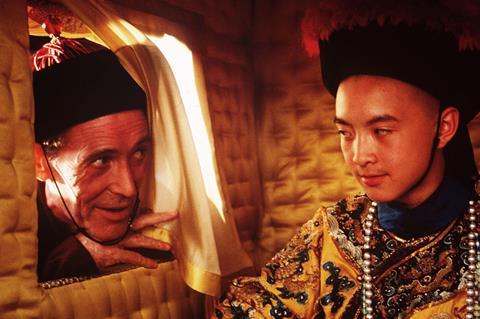The UK producer was speaking at Malta’s Mediterrane Film Festival where he is receiving a lifetime achievement award.

As he approaches his 76th birthday, which falls on July 26, Jeremy Thomas shows no signs of slowing up.
“I am never going to stop [producing]. It’s my life,” said the taboo-breaking UK producer of The Last Emperor, Crash and Naked Lunch at Malta’s Mediterrane Film Festival (MFF), where he is receiving a lifetime achievement award.
As ever, the Recorded Picture Company founder has plenty of new work in the pipeline, including “five or six workable scripts that I am trying to make”.
He is also readying a slate of projects to be unveiled in the coming months: Takashi Miike’s Neon-backed (and sold) thriller Bad Lieutenant: Tokyo, which just finished shooting; Julien Temple’s Jean Pigozzi documentary I Am Curious Johnny, due to premiere at an autumn festival and sold by Submarine; and Jan Komasa’s thriller Good Boy starring Stephen Graham and Andrea Riseborough, which HanWay Films is selling.
Another of Thomas’s recent features, La Grande Maison Paris starring Takuya Kimura and about a famous Japanese chef opening a restaurant in Paris, has grossed $30m in Japan for Toho and Sony Pictures Entertainment.
These are just the latest projects in a producing career that stretches back more than half a century and includes well over 80 credits.
It isn’t getting any easier, however, for the Oscar-winning producer. Despite being one of the most feted UK producers of his generation and a former chair of the British Film Institute, he remains something of an outsider who still works more often abroad than at home.
“I am an Englishman. I was born in Ealing. I have principally lived in west London all my life [but] I am a citizen of the world and most of my films have been made outside the UK because I am a traveller,” he declared in his MFF masterclass.
Thomas claimed he struggles these days even to secure meetings with some UK funders, although declined to identify which ones: “They know who they are.”
When rebuffed, Thomas will stick with projects that other less tenacious producers would surely abandon. “I don’t give up,” he said, citing as examples the 2012 seabound adventure Kon-Tiki, which it took Thomas 20 years to get over the line.
Other long-gestating projects include a movie about English rock band The Kinks, You Really Got Me, and an adaptation of Jonathan Coe’s 2020 novel Mr. Wilder & Me, about the struggles of Billy Wilder to make his penultimate film, 1978’s Fedora.
Changing times
In recent years, amid changing market conditions, Thomas has had to sacrifice the “Jeremy Thomas presents” credit which used to preface all his films, and isn’t “in charge” of his movies in the way he once was.
“The producer’s role has changed. Now, someone you don’t even meet who works for a bank gets a producer credit,” he observed. “The same for the [public] funds in England – they all take credits. You end up with loads and loads of credits.”
On some of his recent features, up to 13 different producers have been listed, whereas in his early work, he was often the only one.
“That has become the way. I feel sorry for the producers today. How can they create an image for themselves? There are so many people who want to share that space with them and can because the producer is so desperate for money that they’ll give away anything to get a film made.”
Thomas remains passionate about UK public film body the British Film Institute (BFI), where he served as chairman from 1992-1997 – and especially the BFI National Archive.
“I am an archive guy,” he declared. “I was principally interested in the archive when Dickie [Attenborough] asked me to be the chair. I was a completely inappropriate chair because I was young and had no experience. I arrived there with all my crazy ideas, but I was more focused on the academia of films, the library and the conservation of film than I was in having a big development department.
“It’s a wonderful institution. It’s unique in the world, but it desperately needs resources for the archive. It is so under-resourced.”
One archival dilemma facing Thomas himself is where to place the riches accrued from his 60-year career. “I have given a lot of it to the BFI, but I don’t know what to do with the principal amount of stuff.”
His collection, which is kept in an air-conditioned storage facility in Essex, includes material from various Thomas-produced films including Nicolas Roeg’s Eureka and Insignificance, Jonathan Glazer’s Sexy Beast and the lyrics David Byrne wrote for David Mackenzie’s Young Adam, which the musician scored.
“If you give it to the BFI, in 25 years they might [not] have dealt with it, they have such a backlog of stuff. So I am trying to decide where to put it. I was the proprietor of the films, and so I kept the costumes, the camera sheets and continuity sheets, the sound tapes, all that stuff I’ve got.”
Although Thomas no longer has any stake in HanWay Films, the sales company he sold to Cohen Media Group three years ago, many of his productions still end up there, being handled by long-trusted colleagues.
“HanWay was fantastic for me, and it is still fantastic. They still sell my films,” he said.
Bertolucci defense
The veteran producer mounted a passionate defence of his old collaborator Bernardo Bertolucci, expressing dismay at cancellations of screenings of the late Italian filmmaker’s Last Tango In Paris amid controversy over the treatment of actress Maria Schneider during the production.
Last December, the Cinematheque in Paris scrapped a planned screening after protests sparked by the rape scene allegedly filmed without Schneider’s consent.

Bertolucci, who died in 2018, worked with Thomas on such celebrated films as The Last Emperor, The Sheltering Sky, Stealing Beauty and The Dreamers. The two men became such close working companions that Bertolucci’s partner, Clare Peploe, used to joke that they were almost like a married couple.
“I am saddened by what has happened. It’s not true,” Thomas insisted of the charges levelled against the Italian director.
“Ask people [who are still] alive. I know people alive who were on that set and I was told by [cinematographer] Vittorio Storaro who shot that film, ‘Jeremy, I am telling you, the only day that Maria was unhappy was the last day of filming because she was very unhappy we were stopping this wonderful experience.’
“Bernardo was a fine moral man and I worked with him for 25 years,” Thomas said. “I still defend my friend. What [else] can you do?”

























No comments yet